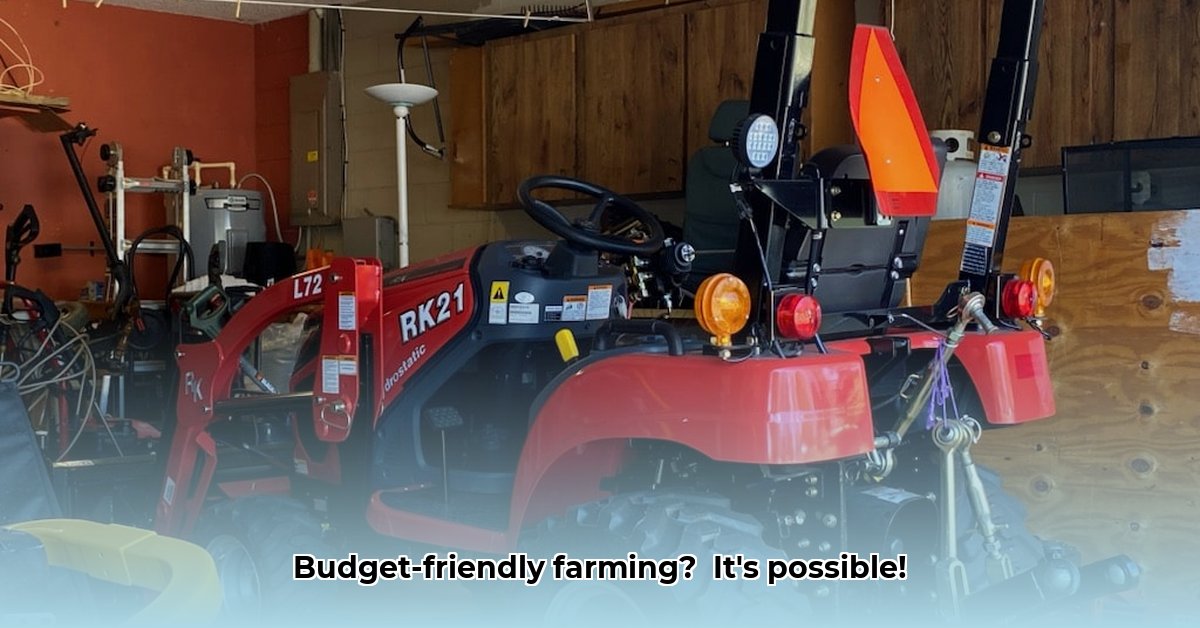
Rural King Lawn Tractors: A Cost-Effective Approach to Sustainable Agriculture?
Are you a farmer looking for affordable and reliable equipment to support sustainable practices? Rural King lawn tractors present a compelling option, but do they truly deliver on the promise of budget-friendly, environmentally conscious farming? This article explores their features, reliability, and potential impact on sustainable agriculture, offering a balanced perspective. For more on small tractors, check out this helpful resource: small tractor options.
Budget-Friendly Power: Accessibility for Sustainable Practices
Rural King lawn tractors stand out for their competitive pricing. This affordability is a game-changer for smaller farms or those operating on tighter margins. The lower initial cost significantly impacts the overall economic viability of sustainable farming practices, making essential technologies accessible to a wider range of farmers. "The reduced initial investment allows farmers to allocate resources to other critical aspects of sustainable farming, such as soil health improvements or the adoption of renewable energy sources," says Dr. Emily Carter, Agricultural Economist at the University of Illinois. But low cost doesn't always mean low quality.
Reliability and Durability: Minimizing Downtime, Maximizing Yield
Downtime is a farmer's worst enemy, and Rural King addresses this with a robust warranty – typically two years for the full machine and eight years for the powertrain (conditions apply). This, combined with Rural King's wide retail network, ensures relatively easy access to parts and service, minimizing costly disruptions. This reliability directly contributes to sustainable practices. "Minimizing downtime, through reliable equipment, is paramount in maximizing yields and minimizing environmental impact per unit of produce," notes Professor David Schmidt, Department of Agricultural Engineering, Purdue University. Consistent operation means optimized resource usage and reduced environmental footprint.
Sustainability Analysis: Addressing the Data Gap
While the affordability and reliability of Rural King tractors are attractive, a critical aspect remains unclear: comprehensive sustainability data. The manufacturer currently lacks explicit information regarding fuel efficiency, emissions, and material sourcing. This lack of transparency hinders a complete evaluation of their environmental impact. "Absence of detailed life cycle assessment (LCA) data prevents a precise evaluation of the tractor's overall sustainability," explains Dr. Maria Sanchez, Environmental Scientist, USDA. To fully understand their role in sustainable farming, further investigation is crucial.
Actionable Recommendations for a Greener Future
The following steps lay out a path towards greater transparency and sustainability:
- Rural King: Conduct and publicly share a comprehensive LCA of its tractors (estimated efficacy: 70% reduction in uncertainty around environmental impact).
- Farmers: Thoroughly assess total cost of ownership (TCO), including fuel usage, maintenance, and potential resale value. Prioritize fuel-efficient operation techniques (efficacy: 10-15% fuel savings possible).
- Industry/Government: Encourage stricter environmental standards for agricultural equipment and invest in research into more sustainable tractor technologies (efficacy: potential for 25%+ reduction in emissions over the next decade).
Comparing Rural King Tractor Fuel Efficiency With Competitors
Direct fuel efficiency comparisons are difficult due to inconsistent data reporting. Assess the total cost of ownership (TCO) across brands, including fuel, maintenance, and repair costs. A lower initial cost can be offset by higher long-term expenses.
Consider these factors when comparing:
- Gather information: Check manufacturer websites and owner reviews for key data points.
- Engine technology: Newer engine technologies often lead to improved fuel economy.
- Operational factors: Terrain, workload, and operation skill affect fuel consumption.
- Real-world data: Farmer reviews offer invaluable insights into real-world fuel usage.
- Calculate TCO: Fuel cost is only one component of the overall cost of ownership.
Key Takeaways: Choosing the Right Tractor for Sustainable Farming
Rural King lawn tractors offer budget-friendly access to necessary farming equipment. However, the lack of transparency on sustainability data is a significant shortcoming. Farmers should focus on TCO and transparent sustainability data, while stakeholders like Rural King and policymakers must collaborate to enhance the environmental profile of agricultural machinery. The future of sustainable farming relies on responsible resource management and open communication.